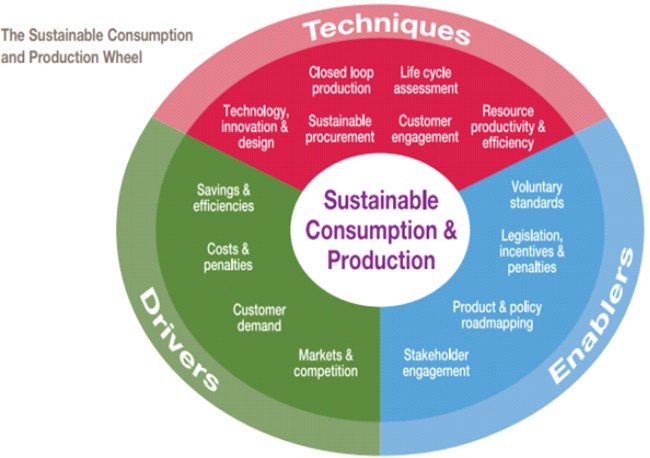|
Sustainable Consumption and Production Wheel
Sustainable livelihoods and consumption, as well as production are critical to achieve sustainable development. Needless to say that education plays a major role in spreading awareness on these concepts. Beginning in Nagoya, 2005, as one of the first seven leading regional centres for Education for Sustainable Development, in a relatively short period, many new such centres have been established worldwide. These centres work actively on developing initiatives that will help meet sustainable livelihood and consumption targets.
Following are the different key aspects of the Sustainable Consumption and Production Wheel: Techniques Businesses, governments and other stakeholders have developed various techniques and approaches to encourage more sustainable consumption and production. These techniques are in various stages of development and provide effective solutions. The challenge of sustainable consumption and production for any organisation is how to use these techniques and approaches to resolve the specific durability challenges. Drivers Saving & efficiencies, costs & penalties, customer demand and markets & competition are the main driving factors for sustainable consumption and production. Some analysts have argued that, for example, if the environmental cost of an oil company producing carbon dioxide (CO2) is factored into it’s production cost, the company will not be as profitable. Enablers
Enabling factors such as implementation of
voluntary standards, legislation & penalties, product & policy road
mapping and stakeholder engagement will gradually identify the market
and result in more sustainable business behaviour. This will create
significant durability effects. However, companies often discover that
their large business environment does not always encourage sustainable
decision making. For example, a company selling cars decides to use
biofuels instead of diesel to run the cars but a government policy
decides to tax such cars at a higher rate. This will not motivate the
company to shift towards sustainability.
■
Rahul B. Chauhan
|
